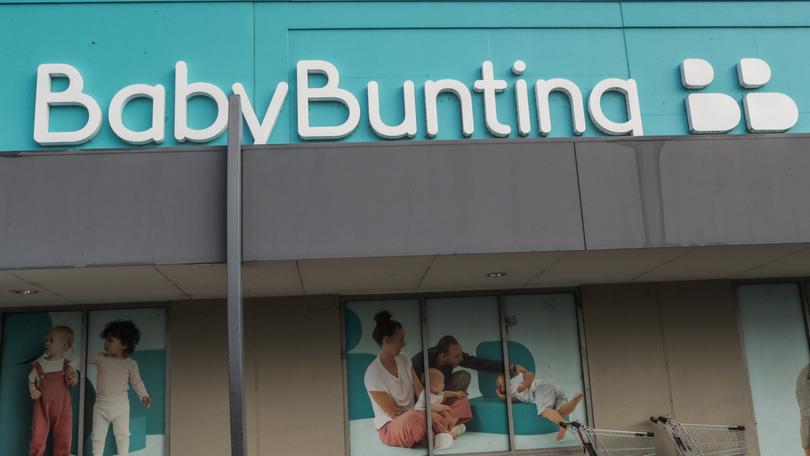Retailers Baby Bunting, JB Hi-Fi and Super Retail Group feel the sting of consumer pullback
A flurry of reports from several top-shelf retailers has highlighted the impact of a pullback in consumer spending as families face cost-of-living pressures and the risk of higher-for-longer interest rates.

A flurry of financial reports from several top-shelf listed retailers has highlighted the impact of a pullback in consumer spending as families face the twin headwinds of cost-of-living pressures and the risk of higher-for-longer interest rates.
The retreat was felt most acutely by Baby Bunting, which also copped the worst of the share market backlash in early trade.
Comparable sales for the second half of the financial year to the end of April plunged 7.7 per cent, compared to a 2.8 per cent decline over the same period a year earlier. Sales in the first half dropped 7 per cent.
Sign up to The Nightly's newsletters.
Get the first look at the digital newspaper, curated daily stories and breaking headlines delivered to your inbox.
By continuing you agree to our Terms and Privacy Policy.The company said the trend of improving sales seen in the period to February had softened over the past two trading months, which it claimed reflected the ongoing cost-of-living pressures being experienced by new parents with young families.
“We’re acutely aware that our customers are more sensitive than many other groups to the widespread cost-of-living pressures and are managing their spending carefully,” chief executive Mark Teperson said.
“While we have seen an improving trend in transactions in 2H compared to 1H, this was heavily impacted by a declining average transaction value driven by consumers trading down and ongoing competition in nursery essentials impacting market price.”
Baby Bunting shares were hammered 23.4 per cent lower to close at $1.455.
Investors also deserted furniture e-retailer Temple & Webster, with shares closing down 17.9 per cent to $10.36. This was despite the company reporting a more positive trading update, with sales up 30 per cent between January 1 and May 5, compared with the prior corresponding period.
Temple & Webster chief executive Mark Coulter said the retailer continued to deliver on its customer promise of providing “beautiful products at outstanding value”.
“This proposition is clearly resonating with shoppers who continue to take advantage of the value that online shopping can deliver,” he said.
“While the overall furniture and homewares market is down 4 per cent (over the period of January 1 to March 31) due to cost-of-living pressures, our strong growth highlights the significant market share gains we are making.”
JB Hi-Fi also reported third-quarter results on Thursday that disappointed the market.
But it was spared the worst of the consumer spending retreat, reporting flat sales across its electronics and white goods empire.
In a trading update that was short on detail, it said total sales at JB Hi-Fi for the three months to the end of March at fell 0.1 per cent while sales at its The Good Guys stores dipped 0.8 per cent.
The company noted a “challenging and competitive retail market” but said third-quarter sales “remained resilient and in line with the group’s expectations”.
“We are pleased with our Q3 FY24 sales results,” said chief executive Terry Smart. “Our trusted value-based offerings and high levels of customer service continue to resonate with our customers.”
JB Hi-Fi stores in New Zealand were the group’s star performers, delivering a 16.8 per cent rise in total sales.
Investors punished the soft result and sent the retailer’s shares closing down 4.5 per cent to $57.25.
Meanwhile, Super Retail Group — the company behind big box outlets Rebel, BCF and Super Cheap Auto — reported a one per cent drop in like-for-like sales over the first 16 weeks of 2024, but noted a slight uptick in March and April.
Sales at outdoor pursuits store BCF dropped 5 per cent, attributed to weak trading during the key Easter holiday period.
“Given current challenges around inflation and interest rates, our customers are managing their spending carefully and becoming increasingly value focused,” said chief executive Anthony Heraghty said.
“While store foot traffic and transaction volumes continue to grow, ongoing cost of living pressure is impacting number of items per sale.”
The result comes less than two weeks after it was revealed an expected legal action against SRG will also extend to its chief Mr Heraghty.
The group announced to the ASX late last month that it was expecting a legal claim for between $30 million and $50m from staffers alleging bullying and victimisation and an inappropriate relationship between Mr Heraghty and its former human resources chief, later identified as Jane Kelly.
SRG also felt the wrath of disgruntled investors, with its shares closing down 5.4 per cent to $13.02.
Originally published as Retailers Baby Bunting, JB Hi-Fi and Super Retail Group feel the sting of consumer pullback
